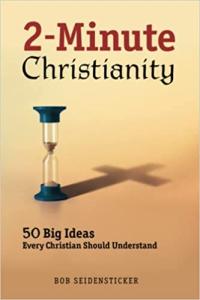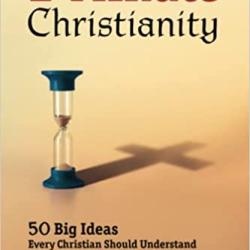
Atheist and anti-theist Bob Seidensticker runs the influential Cross Examined blog. I have critiqued 80 of his posts, but he hasn’t counter-replied to any of them. Nevertheless, he was gracious enough to send me a free e-book copy of his new volume, 2-Minute Christianity: 50 Big Ideas Every Christian Should Understand (May 2022). He (unsurprisingly) declined to discuss it back-and-forth, but at least we were civil and cordial. Since I have responded to so much of his material, over four-and-a-half years, I decided to see how many of the 50 issues raised by this book have already, in effect, been “resolved” in my existing writings. And I’ll add a few present responses as well. His words will be in blue.
*****
Bob writes in his Introduction: “Is Christianity true? If it is, it can withstand critique. If you have a religious belief, it should be grounded by evidence and reason.” The blurb on the Amazon book page adds: “If God wanted mindless faith, he wouldn’t have given you a mind.” Yep; I couldn’t agree more. That’s what I have devoted my life’s work to: offering evidence and reason for all aspects of the Christian faith (what is called “apologetics”). And so I’ll apply that goal to this book. It offers critiques; here I offer solid, superior Christian answers to them. Let the reader decide who has made a better, more convincing case.
1 Map of World Religions
Let’s return to the map of world religions. Religions claim to give answers to life’s big questions, answers that science can’t give. . . . But the map shows that the religious answers to those questions depend on where you are. . . . We ask the most profound questions of all, and the answers are location specific? What kind of truth depends on location?
38 Christianity Without Indoctrination
39 The Monty Hall Problem
48 Religion Reflects Culture
No truth depends on location; I fully agree. I don’t deny that people’s opinions mostly arise from their environment (“we are what we eat”). But I go on to note that atheists are no different. So, for example, in England about 50% of the population is non-religious (which comes down to atheist or “practical atheist” — which I used to be, myself, up until age 18: living one’s life as if God doesn’t exist).
Therefore, by the very same reasoning that Bob offers, I’d bet good money that in twenty years from now, the atheist population will remain at least this high and maybe grow. And why would that be, if so? It’s precisely because most people adopt the religion or other worldview of their parents. So the atheist growing up in an intensely secularized English home will (big shock!) likely turn out to be an atheist, just as ostensibly Christian environments churn out Christians: at least in name only (sadly, often not much more).
Bob’s buddy and fellow Internet anti-theist John Loftus is very big on this argument. He calls it “the outsider test of faith.” I answered his argument over fifteen years ago, and (as usual) he decided not to grapple with my critique. Here is part of what I wrote:
Religion needs to be held with a great deal more rationality and self-conscious analysis for the epistemological basis and various types of evidences for one’s own belief. I believe everyone should study to know why they believe what they believe.
This “one becomes whatever their surroundings dictate” argument can be turned around as a critique of atheism. Many atheists — though usually not born in that worldview — nevertheless have decided to immerse themselves in atheist / skeptical literature and surround themselves with others of like mind. And so they become confirmed in their beliefs. We are what we eat. In other words, one can voluntarily decide to shut off other modes and ways of thinking in order to “convince” themselves of a particular viewpoint. That is almost the same mentality as adopting a religion simply because “everyone else” in a culture does so, or because of an accident of birth. People can create an “accident of one-way reading” too.
My position, in contrast, is for people to read the best advocates of any given debate and see them interact with each other. That’s why I do so many dialogues. John Loftus could write these papers, and they may seem to be wonderfully plausible, until someone like me comes around to point out the fallacies in them and to challenge some of the alleged facts. Read both sides. Exercise your critical faculties. Don’t just read only Christians or only atheists. Look for debates where both sides know their stuff and have the confidence to defend themselves and the courage and honesty to change their opinions if they have been shown that truth and fact demand it.
Another related “turn the tables” argument along these lines is to note that many famous atheists had either no fathers, or terrible ones, with whom they had little relationship (as I have written about). They projected that onto God as the Cosmic Father and rejected Him.
This was true with regard to atheists such as Freud, Marx, Feuerbach, Baron d’Holbach, Bertrand Russell, Nietzsche, Sartre, Camus, Schopenhauer, Hobbes, Samuel Butler, H. G. Wells, Carlyle, Madalyn Murray O’Hair, and Albert Ellis. Theology based on family relations or lack thereof? That’s hardly a rational or objective analysis. That proves nothing. But there you have it: many atheists have this background: a “map of atheist families” so to speak.
2 A Leaky Ark
This is not one sustained argument, but the typical atheist “100 questions at once” routine. No one can possibly answer all these questions at once (which is why this cynical tactic is often used), unless they have made a sustained, in-depth study of the matter, as I have.
To see the many articles I’ve written about it, please visit my Bible & Archaeology / Bible & Science collection, and word-search “Noah’s Flood” and “Flood & Noah” for all the resources. Here I’ll make brief replies to a sampling of four of Bob’s innumerable rapid-fire “gotcha”” questions.
It would have required tens of thousands of big trees. Where did the wood come from?
We know that wood was available in northern Mesopotamia around 2900 BC (when and where I posit that a local Flood occurred) and could be shipped down the Tigris and Euphrates rivers to the plains where wood was scarce.
How could all the world’s species fit on board?
They didn’t have to, since it was a local Mesopotamian flood.
What did the carnivores eat while on the voyage?
I suggested a possible solution to that in a 2015 article.
A worldwide flood would have buried the bodies of animals from the same ecosystem together. . . . The fossil record doesn’t show this. . . . Geologists tell us there is no evidence for a worldwide flood, . . .
Again, educated Catholics and Protestants alike have believed that the Flood was local, not worldwide (and that the Bible, rightly interpreted, is fully harmonious with this view), for well over a hundred years now. I addressed this straw man in a reply to atheist Jonathan MS Pearce a few months back.
3 The Bible’s Shortsighted View of the Universe
Here Bob mocks biblical cosmology, which he clearly doesn’t understand very well; and so he presents the usual caricatured, warped view of the biblical skeptic. I’ve written many articles along these lines:
Biblical Flat Earth (?) Cosmology: Dialogue w Atheist (vs. Matthew Green) [9-11-06]
Flat Earth: Biblical Teaching? (vs. Ed Babinski) [9-17-06]
Genesis Contradictory (?) Creation Accounts & Hebrew Time: + Refutation of a Clueless Atheist “Biblical Contradiction” [5-11-17]
Seidensticker Folly #21: Atheist “Bible Science” Absurdities [9-25-18]
Seidensticker Folly #23: Atheist “Bible Science” Inanities, Pt. 2 [10-2-18]
Carrier Critique #3: Bible Teaches a Flat Earth? [3-31-22]
4 Christianity as Society’s Burden
The period when Christianity was in charge in Europe didn’t stand out for the flowering of science and technology. There was innovation during the medieval period (eyeglasses, the water wheel, metal armor and gunpowder weapons, castles, crop rotation, and others), but that was in spite of Christianity, not because of it.
10 The Society that Christianity Gave Us
47 Christianity’s Big Promises
This is sheer nonsense and myth. Eminent physicist Paul Davies (as far as I can tell, a pantheist) stated in his 1995 Templeton Prize Address:
All the early scientists such as Newton were religious in one way or another. … science can proceed only if the scientist adopts an essentially theological world view.
Philosopher Alfred North Whitehead (1861-1947) expressed the same notion in his book Science and the Modern World (1925):
The inexpugnable belief that every detailed occurrence can be correlated with its antecedents in a perfectly definite manner … must come from the medieval insistence on the rationality of God …
My explanation is that the faith in the possibility of science, generated antecedently to the development of modern scientific theory, is an unconscious derivative from medieval theology.
One of the leading philosophers of science, Thomas Kuhn (1922-1996), elucidated the medieval background in his book, The Copernican Revolution (New York: Vintage Books / Random House, 1959):
After the Dark Ages the Church began to support a learned tradition as abstract, subtle, and rigorous as any the world has known … The Copernican theory evolved within a learned tradition sponsored and supported by the Church … (p. 106)
The centuries of scholasticism are the centuries in which the tradition of ancient science and philosophy was simultaneously reconstituted, assimilated, and tested for adequacy. As weak spots were discovered, they immediately became the foci for the first effective research in the modern world. … And more important than these is the attitude that modern scientists inherited from their medieval predecessors: an unbounded faith in the power of human reason to solve the problems of nature. (p. 123)
Loren Eiseley, an anthropologist, educator, philosopher, and natural science writer, who received more than 36 honorary degrees, and was himself an agnostic in religious matters, observed:
It is the Christian world which finally gave birth in a clear articulated fashion to the experimental method of science itself … It is surely one of the curious paradoxes of history that science, which professionally has little to do with faith, owes its origins to an act of faith that the universe can be rationally interpreted, and that science today is sustained by that assumption. (Darwin’s Centenary: Evolution and the Men who Discovered it, New York: Doubleday: 1961, p. 62)
In my research, I have discovered that Christians or theists were the founders of at least 115 different scientific fields (see the entire list). Here are a select 49 from that list (an asterisk denotes a Catholic priest):
- Anatomy, Comparative: Georges Cuvier (1769-1832) Astronomy, Big Bang Cosmology: Georges Lemaître (1894-1966*)
- Atomic Theory: Roger Boscovich (1711-1787*) John Dalton (1766-1844)
- Bacteriology: Louis Pasteur (1822-1895)
- Biochemistry: Franciscus Sylvius (1614-1672) / Antoine Lavoisier (1743-1794)
- Biology / Natural History: John Ray (1627-1705)
- Calculus: Blaise Pascal (1623-1662)
- Cardiology: William Harvey (1578-1657)
- Chemistry: Robert Boyle (1627-1691)
- Dynamics: Isaac Newton (1642-1727)
- Electrodynamics: André-Marie Ampère (1775-1836) / James Clerk Maxwell (1831-1879)
- Electromagnetics: André-Marie Ampère (1775-1836) / Michael Faraday (1791-1867) / Joseph Henry (1797-1878) /
- James Clerk Maxwell (1831-1879)
- Electronics: Michael Faraday (1791-1867) / John Ambrose Fleming (1849-1945)
- Genetics: Gregor Mendel (1822-1884*)
- Geology: Blessed Nicolas Steno (1638-1686*) / James Hutton (1726-1797)
- Geophysics: Jose de Acosta (1540-1600*)
- Hydraulics: Leonardo da Vinci (1452-1519) / Blaise Pascal (1623-1662)
- Hydrodynamics: Blaise Pascal (1623-1662)
- Mechanics, Celestial: Johannes Kepler (1571-1630)
- Mechanics, Classical: Isaac Newton (1642-1727)
- Mechanics, Quantum: Max Planck (1858-1947) / Werner Heisenberg (1901-1976)
- Mechanics, Wave: Erwin Schrödinger (1887-1961)
- Meteorology: Evangelista Torricelli (1608-1647) / Lazzaro Spallanzani (1729-1799*)
- Neurology: Charles Bell (1774-1842)
- Paleontology: John Woodward (1665-1728)
- Paleontology, Vertebrate: Georges Cuvier (1769-1832)
- Pathology: Marie François Xavier Bichat (1771-1802) / Thomas Hodgkin (1798-1866) / Rudolph Virchow (1821-1902)
- Physics, Atomic: Joseph J. Thomson (1856-1940)
- Physics, Classical: Isaac Newton (1642-1727)
- Physics, Experimental: Galileo Galilei (1564-1642)
- Physics, Mathematical: Johannes Kepler (1571-1630) / Christiaan Huygens (1629-1695) / Isaac Newton (1642-1727)
- Physics, Nuclear: Ernest Rutherford (1871-1937)
- Physics, Particle: John Dalton (1766-1844)
- Physiology: William Harvey (1578-1657)
- Probability Theory: Pierre de Fermat (c. 1607-1665) / Blaise Pascal (1623-1662) / Christiaan Huygens (1629-1695)
- Scientific Method: Francis Bacon (1561-1626) / Galileo Galilei (1564-1642) / Pierre Gassendi (1592-1655*)
- Seismology: John Michell (1724-1793)
- Stellar Spectroscopy: Pietro Angelo Secchi (1818-1878*) / Sir William Huggins (1824-1910)
- Stratigraphy: Blessed Nicolas Steno (1638-1686*)
- Surgery: Ambroise Paré (c. 1510-1590)
- Taxonomy: Carol Linnaeus (1707-1778)
- Thermochemistry: Antoine Lavoisier (1743-1794) Thermodynamics: James Joule (1818-1889) / Lord Kelvin (1824-1907)
- Thermodynamics, Chemical: Josiah Willard Gibbs (1839-1903) Thermodynamics, Statistical: James Clerk Maxwell (1831-1879) Thermokinetics: Humphrey Davy (1778-1829)
- Transplantology: Alexis Carrel (1873-1944) Joseph Murray (b. 1919)
- Volcanology: Athanasius Kircher (1602–1680*) / Lazzaro Spallanzani (1729-1799*) / James Dwight Dana (1813-1895) Zoology: Conrad Gessner (1516-1565)
See also:
Reply to Atheist Scientist Jerry Coyne: Are Science and Religion Utterly Incompatible? [7-13-10]
Christianity: Crucial to the Origin of Science [8-1-10]
Books by Dave Armstrong: Science and Christianity: Close Partners or Mortal Enemies? [10-20-10]
Albert Einstein’s “Cosmic Religion”: In His Own Words [originally 2-17-03; expanded greatly on 8-26-10]
Atheist French, Soviet, & Chinese Executions of Scientists [10-22-15]
Loftus Atheist Error #7: Christian Influence on Science [9-9-19]
The Bible is Not “Anti-Scientific,” as Skeptics Claim [National Catholic Register, 10-23-19]
The ‘Enlightenment’ Inquisition Against Great Scientists [National Catholic Register, 5-13-20]
Embarrassing Errors of Historical Science [National Catholic Register, 5-20-20]
Seidensticker Folly #44: Historic Christianity & Science [8-29-20]
5 Jesus, the Great Physician
15 The Bible Has No Recipe for Soap
In addition to soap, the Bible could have then added the basics of health care—when and how to use this soap, how boiling will purify water, how to build and site latrines, how to avoid polluting the water supply, how to respond to a plague, how germs transmit disease, the basics of nutrition, how to treat wounds, and so on. After health, it could outline other ways to improve society—low-tech ways to pump water, spin fiber, make metal alloys, keep livestock healthy, or improve crop yields.
Bob goes after the Bible as supposedly anti-medicine, because healings took place, and there is no recipe for soap. It’s not. I’ve written about this several times, too.
Demonic Possession or Epilepsy? (Bible & Science) [2015]
The Bible on Germs, Sanitation, & Infectious Diseases [3-16-20]
Bible on Germ Theory: An Atheist Hems & Haws (. . . while I offer a serious answer to his caricature regarding the Bible and genetics) [8-31-21]
6 Argument from Desire
Theistic Argument from Desire: Dialogue w Atheist [12-2-06]
Theistic Argument from Longing or Beauty, & Einstein [3-27-08; rev. 3-14-19]
Dialogue with an Agnostic: God as a “Properly Basic Belief” [10-5-15]
Implicit (Extra-Empirical) Faith, According to John Henry Newman [12-18-15]
Argument for God from Desire: Atheist-Christian Dialogue [8-7-17]
7 Psalm 22 Prophecy
Reply to Atheist on Messianic Prophecies (Zech 13:6, Ps 22) [7-3-10]
8 Ontological Argument
*
*
9 Original Sin
*
*
*
*
*
11 Paul’s Famous Creed
*
Jesus “raised on the third day according to the Scriptures” is a reference to the book of Jonah (“Jonah was in the belly of the fish three days and three nights”), but the resurrection can’t be “according” to this scripture when the author of Jonah wasn’t making a prophecy. And this “prophecy” fails since Jesus was dead for only two nights, from Friday evening to Sunday morning.
*
*
*
12 Christianity Answers Life’s Big Questions
*
19 Kalam Cosmological Argument
*
The only “begins to exist” we know of is the rearrangement of existing matter and energy. An oak tree begins with an acorn and builds itself from water, carbon dioxide, and other nutrients, but God supposedly created the universe ex nihilo (“out of nothing”). The apologist must then defend “Whatever begins to exist from nothing has a cause,” but there is no evidence to support this claim.
*
*
*
*
*
*
*
*
16 Christianity Meets its Match [Mormonism]
*
*
17 Euthyphro Dilemma
*
Does God have such a fixed, external source of morality that he consults? Then Christians are caught on one horn of the dilemma. Or does the buck have to stop somewhere, and God is it? Then Christians are caught on the other horn. Neither makes God look good.
*
18 Morality, Purpose, and Meaning
*
Morality, purpose, and meaning don’t come from outside our world but have always been ours to define.
*
34 Why Is Christianity Conservative?
*
*
*
*
Perhaps most surprising is that Paul taught nothing about the Trinity, . . .
*
This is dead-wrong and astonishingly ignorant . . . see his many many statements about the Trinity and deity of Christ in my compilations:
*
*
*
*
21 God Loves the Smell of Burning Flesh
*
*
22 Thought Experiment on Bible Reliability
*
The time between when Matthew was written and our best copies, averaging the gap chapter by chapter, is two hundred years. It’s a little less for Luke and John and a little more for Mark. How do we know those books made it through that obscure dark period without significant change?
*
31 25,000 New Testament Manuscripts
*
*
I just wrote yesterday, in replying to another atheist:
The oldest extant manuscript for the Histories of the Greek historian Herodotus (c. 484 – c. 425 BC), for example, is Codex Laurentianus LXX, from the 10th century (see more information on his manuscripts). By my math that is 1300-1500 years after it was written. The History of the Peloponnesian War was written at the end of the 5th century BC by Thucydides (c. 460 – c. 400 BC). The earliest manuscript for it dates from the 11th century (1400-1500 years later). The Geography by Strabo (c. 64 BC – c. 24 AD) was composed shortly before the birth of Christ. The best manuscript is from the end of the tenth century (900-1,000 years later).
I think readers get the idea, without need of further examples. The moral of the story is: “don’t try to make out that biblical manuscripts or editorial / linguistic revisions, etc., are something wholly unique, or uniquely problematic.”
The classic example of extraordinary preservation of biblical texts is the complete Isaiah scroll from the Dead Sea Scrolls. One Christian website summarizes:
A significant comparison study was conducted with the Isaiah Scroll written around 100 B.C. that was found among the Dead Sea documents and the book of Isaiah found in the Masoretic text. After much research, scholars found that the two texts were practically identical. Most variants were minor spelling differences, and none affected the meaning of the text.
One of the most respected Old Testament scholars, the late Gleason Archer, examined the two Isaiah scrolls found in Cave 1 and wrote, “Even though the two copies of Isaiah discovered in Qumran Cave 1 near the Dead Sea in 1947 were a thousand years earlier than the oldest dated manuscript previously known (A.D. 980), they proved to be word for word identical with our standard Hebrew Bible in more than 95 percent of the text. The five percent of variation consisted chiefly of obvious slips of the pen and variations in spelling.”
So a measly two hundred years? That’s nothing . . .
23 Isaiah 53 Prophecy
*
this suffering servant is likely the nation of Israel, punished through the Babylonian exile. This is also the traditional Jewish interpretation. In addition, any parallels between the Isaiah 53 “suffering servant” and Jesus are easily explained by the gospel authors using the Jewish scripture to embellish the gospels.
*
*
*
24 Atheists Need the Christian Worldview
*
“God did it” is no more useful or informative than “logic and arithmetic are just properties of our reality” or “that’s just the way it is” or even “I don’t know.” An interesting question has been suppressed, not resolved. In fact, by the theologian’s own reasoning, his answer rests in midair because he gives no reason to conclude God exists. His claim is no more believable than that from any other religion—that is, not at all.
The person who stops at “God did it” has stated an opinion only—an opinion with no evidence to support it. It doesn’t advance the cause of truth at all. Mathematics is tested, and it works. God is an unnecessary and unhelpful addition to the mix.
25 Transcendental Argument
*
*
*
26 Women at the Tomb
*
If Bob’s argument here were coherent and clear, I would provide some answer for it. But I read it three times and, for the life of me, I can’t figure out what in the world he is contending (it’s not the usual claim in resurrection disputes, of allegedly contradictory accounts), so I’ll pass. Bob’s writing — wrong though it invariably is — is usually quite easy to understand. Since Bob won’t dialogue with me, I guess I’ll likely never find out. Not that I will lose any sleep over it or have an existential crisis . . .
*
27 When God Lies
*
God once lied through a prophet. King Ahab of Israel consulted his 400 prophets about an upcoming battle, and they assured him of success. Only one prophet predicted disaster, but he was correct. God wanted Ahab to die and authorized a spirit to cause the other prophets to lie to lure him into the battle.
*
*
In the Exodus story, God hardened Pharaoh’s heart to prevent him from releasing the Israelites. The New Testament has God doing the same thing. To those destined for hell, “God sends them a powerful delusion so that they will believe the lie and so that all will be condemned who have not believed the truth but have delighted in wickedness.”
The Jewish opponents of Jesus were treated the same way. They saw his miracles. They didn’t believe, but not because the evidence was poor, because they didn’t understand, or because they were stubborn. No, they didn’t believe because God deliberately prevented them from believing. “[God] has blinded their eyes and hardened their hearts, so they can neither see with their eyes, nor understand with their hearts.” But why harden the hearts of bad people? Were they going to do bad things of their own accord or not?
Perhaps atheists also don’t believe because God hardened their hearts. If so, why do they deserve hell?
God “Hardening Hearts”: How Do We Interpret That? [12-18-08]
28 Fruits of Christianity
Now consider hospitals. Christians might point to medieval hospitals to argue that they were pioneers in giving us the medical system we know today, but without science, a hospital can do nothing but give food and comfort. Church-supported hospitals centuries ago were little more than almshouses or places to die.
Seidensticker Folly #59: Medieval Hospitals & Medicine [11-3-20]
Seidensticker Folly #60: Anti-Intellectual Medieval Christians? [11-4-20]
Medieval Christian Medicine Was the Forerunner of Modern Medicine [National Catholic Register, 11-13-20]
Carrier Critique #4: Bible & Disease & Medicine (+ Medical Advances Made in the Christian-Dominated Middle Ages) [3-31-22]
“Medieval medicine of Western Europe” (Wikipedia)
“Forget folk remedies, Medieval Europe spawned a golden age of medical theory” (Winston Black (professor of medieval history], The Conversation, 5-14-14)
“Medicine or Magic? Physicians in the Middle Ages” (William Gries, The Histories, Vol. 15, Issue 1, 2019)
“Top 10 Medical Advances from the Middle Ages” (Medievalists.Net, Nov. 2015). The ten advances are the following:
Hospitals / Pharmacies / Eyeglasses / Anatomy and Dissection / Medial Education in Universities / Ophthalmology and Optics / Cleaning Wounds / Caesarean sections / Quarantine / Dental amalgams
Scientific & Empiricist Church Fathers: To Augustine (d. 430) [2010]
Christian Influence on Science: Master List of Scores of Bibliographical and Internet Resources (Links) [8-4-10]
33 Empiricist Christian Thinkers Before 1000 AD [8-5-10]
23 Catholic Medieval Proto-Scientists: 12th-13th Centuries [2010]
St. Augustine: Astrology is Absurd [9-4-15]
Catholics & Science #1: Hermann of Reichenau [10-21-15]
Catholics & Science #2: Adelard of Bath [10-21-15]
A List of 244 Priest-Scientists [Angelo Stagnaro, National Catholic Register, 11-29-16]
A Short List of [152] Lay Catholic Scientists [Angelo Stagnaro, National Catholic Register, 12-30-16]
29 Christianity Looks Invented
historians of religion tell us Yahweh looks like other Canaanite deities of the time. There were other tribes in Canaan, and the Bible mentions these—for example, Ammon, Midian, and Edom, as well as Israel—and each had its own god. This I’ve-got-my-big-brother-and-you-have-yours approach is henotheism, halfway between polytheism (lots of gods, and each affects our world) and monotheism (just one god—any others are imposters). With henotheism, each tribe assigned itself its own god. They acknowledged the existence of the other tribes’ gods but worshipped only one. Moloch was the god of the Ammonites, Chemosh was the god of the Midianites, and Yahweh was the god of the Israelites.
Yahweh looks like nothing but one more invented god.
35 Biblical Polytheism
42 The Combat Myth
46 God’s Kryptonite
*
*
*
*
*
*
30 The Ten Commandments
Most Christians know the story of Moses and the Ten Commandments, but few realize that God created two very different versions of the Law.
*
Or look at the practice of Christianity today. Why is there a Bible Answer Man radio program, and why does GotQuestions.org boast that it has more than half a million Bible questions answered? Shouldn’t God’s message be so clear that there would be no questions to answer? Why are there 1600-page books on systematic theology—why would the study of a perfect god need this? Why is it so complicated?
Bible “Difficulties” Are No Disproof of Biblical Inspiration [National Catholic Register, 6-29-19]
“Difficulty” in Understanding the Bible: Hebrew Cultural Factors [2-5-21]
An Omniscient God and a “Clear” Bible [National Catholic Register, 2-28-21]
33 Recreating Christianity
Now imagine that all knowledge of Christianity were lost as well. A new generation might make up something to replace it, since humans seem determined to find the supernatural in our world, but they wouldn’t recreate the same thing. There is no specific evidence of the Christian God around us today. The only evidence of God in our world is tradition and the Bible. Lose them, and Christianity would be lost forever.
Bob comes up with this thought experiment and then provides the Christian and biblical answer to it:
The Bible comments on our thought experiment. It claims, “Since the creation of the world God’s invisible qualities—his eternal power and divine nature—have been clearly seen, being understood from what has been made, so that people are without excuse.” [Romans 1:20] But that’s exactly the problem—God is not clearly seen.
Having solved the problem, Bob simply denies that God is seen in His creation. Well, that’s his opinion. Virtually all of the greatest minds in the first several hundred years of scientific development agreed with this and were theists or Christians. So were many of the greatest philosophers in western civilization. They all saw what Bob can’t see. So how do we decide who is right? Even Einstein stated:
My religiosity consists of a humble admiration of the infinitely superior spirit that reveals itself in the little that we can comprehend about the knowable world. That deeply emotional conviction of the presence of a superior reasoning power, which is revealed in the incomprehensible universe, forms my idea of God. (To a banker in Colorado, 1927. Cited in the New York Times obituary, April 19, 1955)
Everyone who is seriously involved in the pursuit of science becomes convinced that a spirit is manifest in the laws of the universe — a spirit vastly superior to that of man . . . In this way the pursuit of science leads to a religious feeling of a special sort . . . (To student Phyllis Right, who asked if scientists pray; January 24, 1936)
Then there are the fanatical atheists . . . They are creatures who can’t hear the music of the spheres. (August 7, 1941)
My point is that perceiving God in the universe that He made is not utterly implausible or unable to be held by the most rigorous, “non-dogmatic” intellects, such as Albert Einstein and David Hume (who — contrary to a widespread myth — was a deist or “minimal theist” and actually accepted one form of the teleological argument). And the atheist has to account for that fact somehow, it seems to me. Hume wrote:
The order of the universe proves an omnipotent mind. (Treatise, 633n)
Wherever I see order, I infer from experience that there, there hath been Design and Contrivance . . . the same principle obliges me to infer an infinitely perfect Architect from the Infinite Art and Contrivance which is displayed in the whole fabric of the universe. (Letters, 25-26)
The whole frame of nature bespeaks an intelligent author; and no rational enquirer can, after serious reflection, suspend his belief a moment with regard to the primary principles of genuine Theism and Religion . . .
Were men led into the apprehension of invisible, intelligent power by a contemplation of the works of nature, they could never possibly entertain any conception but of one single being, who bestowed existence and order on this vast machine, and adjusted all its parts, according to one regular plan or connected system . . .
All things of the universe are evidently of a piece. Every thing is adjusted to every thing. One design prevails throughout the whole. And this uniformity leads the mind to acknowledge one author. (Natural History of Religion, 1757, ed. H.E. Root, London: 1956, 21, 26)
Now, I ask atheists: whence comes Einstein’s “deeply” felt “conviction” or Hume’s conclusion of “an infinitely perfect Architect”? Is it a philosophical reason or the end result of a syllogism? They simply have it. It is an intuitive or instinctive feeling or “knowledge” or “sense of wonder at the incredible, mind-boggling marvels of the universe” in those who have it. Bob doesn’t have this sense. But he has no rational or objective or logical basis with which to mock those — like Einstein and Hume — who do. Their experience is their own, just as Bob’s is his own: all equally valid in terms of the person’s subjective perspective or epistemological warrant.
36 Virgin Birth Prophecy
Reply to Atheist Jonathan MS Pearce: “Mistranslation” of “Virgin”? (Isaiah 7:14) (with Glenn Miller) [7-26-17]
*
37 God’s Hiddenness
*
*
*
*
*
*
40 Historians Reject the Bible Story
*
Here Bob says that historians reject the Gospels because they contain miracles. It’s too broad of a statement. Not all historians do so. Meanwhile, there continues to be a lot of archaeological and historical confirmation of the Gospels’ historical trustworthiness:
*
*
*
*
*
Pearce’s Potshots #64: Archaeology & 1st Century Nazareth [2-25-22]
Ehrman Errors #11: Luke the Unreliable Historian? (Debunking Yet More of the Endless Pseudo-“Contradictions” Supposedly All Over the Bible) [3-28-22]
King Herod Agrippa I (d. 44 AD) Eaten By Worms: Pure Myth & Nonsense or Scientifically Plausible? [Facebook, 10-8-22]
41 Who Wrote the Gospels?
*
How do we know the apostle Mark wrote the gospel of Mark? How do we know Mark recorded the observations of Peter, an eyewitness?
*
*
*
43 The Crucifixion
*
Here, Bob delves into deep waters of Christian soteriology (the theology of salvation): talking off the top of his head. There is no point in wrangling with him about such matters. He doesn’t even understand the elementary things of Christianity. He could no more grasp this than a two-year-old could comprehend calculus or the theory of relativity. As Paul explained in 1 Corinthians 2:14: “The unspiritual man does not receive the gifts of the Spirit of God, for they are folly to him, and he is not able to understand them because they are spiritually discerned.”
*
44 Finding Jesus Through Board Games
*
This is scarcely an argument. It’s basically a totally subjective, biased thought experiment. It carries no force or challenge, and so it need not be replied to.
*
45 Jesus on Trial
*
This is no argument, either. Rather, it is a plea for folks to remain open-minded and open to a change of mind. As one who has undergone many major changes of mind in my life: in religion, morals, political positions, and other matters, I completely agree!
*
49 Religions Continue to Diverge
*
This gist of this is that “religious folks disagree, therefore, no single religious view can possibly be true, or even largely true.” This is “epistemological kindergarten” thinking, and as such, deserves no further attention.
*
50 The Great Commission
*
Here, Bob preaches to Christians, authoritatively interprets several biblical injunctions, and suggests we be more like atheists. Not an argument . . .
*
***
Practical Matters: Perhaps some of my 4,000+ free online articles (the most comprehensive “one-stop” Catholic apologetics site) or fifty books have helped you (by God’s grace) to decide to become Catholic or to return to the Church, or better understand some doctrines and why we believe them.
Or you may believe my work is worthy to support for the purpose of apologetics and evangelism in general. If so, please seriously consider a much-needed financial contribution. I’m always in need of more funds: especially monthly support. “The laborer is worthy of his wages” (1 Tim 5:18, NKJV). 1 December 2021 was my 20th anniversary as a full-time Catholic apologist, and February 2022 marked the 25th anniversary of my blog.
PayPal donations are the easiest: just send to my email address: [email protected]. You’ll see the term “Catholic Used Book Service”, which is my old side-business. To learn about the different methods of contributing, including 100% tax deduction, etc., see my page: About Catholic Apologist Dave Armstrong / Donation Information. Thanks a million from the bottom of my heart!
***
Photo credit: cover of Bob Seidensticker’s
***
Summary: I provide answers to atheist anti-theist Bob Seidensticker’s “2-Minute” anti-Christian arguments: neatly compiled into fifty two-page provocative, polemical queries.



























